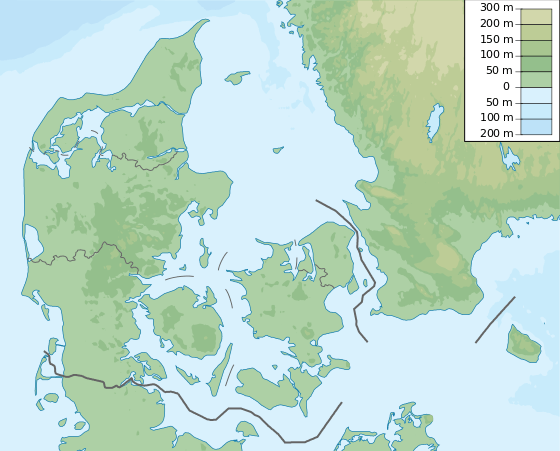Vindeby Offshore Wind Farm
| Vindeby Offshore Wind Farm | |
|---|---|
 Location of Vindeby Offshore Wind Farm in Denmark | |
| Country | Denmark |
| Coordinates | 54°58′12″N 11°7′48″E / 54.97000°N 11.13000°ECoordinates: 54°58′12″N 11°7′48″E / 54.97000°N 11.13000°E[1] |
| Status | Operational |
| Commission date | 1991 |
| Construction cost | 75 million Danish kroner |
| Owner(s) | DONG Energy |
| Wind farm | |
| Max. water depth | 2–4 m (7–13 ft) |
| Distance from shore | 2 km (1 mi) |
| Hub height | 35 |
| Rotor diameter | 35 |
| Power generation | |
| Make and model | Bonus |
| Nameplate capacity | 4.95 MW |
| Capacity factor | 22.9 %[2] |
Vindeby Offshore Wind Farm is the first offshore wind farm in the world, made in 1991.
History
Elkraft began considering offshore turbines in 1987, and surveyed the waters around Lolland in 1989.[3]
The wind farm started in 1991 and cost an estimated 10 million €, built by SEAS and Elkraft. The electricity industry at the time generally considered offshore turbines to be ludicrous, as they were placed in salty conditions and were much smaller than central power plants.[4][5] The sceptic attitude had changed 6 years later, as offshore winds drove production higher than on land.[6][7] As of 2015, global offshore wind power capacity is 11 GW, and there are plans for much more.[8]
A single wind turbine had been erected in Swedish waters earlier, but Vindeby was the first collection of turbines, making it the first offshore wind farm.[5] Four years later, the similar sized Tunø Knob wind farm was made.[9][10] Tests were done to learn what to do and what not to do. Experience from Vindeby contributed to the development of cheaper ways to extract power from offshore winds.[11]
The original government concession is for 25 years; from 1991 to 2016. In 2016, DONG Energy considered shutting down the wind farm, as it is well past its design life and had become uneconomical. Vindeby was the first in a long line of wind farms in a downwards cost trend.[4][12]
Technology
The developers contracted Bonus Energy to supply 11 wind turbines (450 kW each) for the project, placed in shallow waters.[1] The annual power is equivalent to 2-3,000 Danish households. The turbines were modified for offshore use by sealing the towers and controlling the humidity inside, extending the life of the machinery.[13][5]
The area was also used for a wave plant in 2010.[14]
Construction
The 11 turbines were erected in 11 days.[5]
Operation
As of 2015, the farm has produced 242 GWh.[2][15]
See also
References
- 1 2 "Vindeby". 4C Offshore Limited. Retrieved 2016-02-09.
- 1 2 "Capacity factors at Danish offshore wind farms". energynumbers.info/. 2016-01-22. Retrieved 2016-02-09.
- ↑ "Elkraft igang med verdens første offshore møllepark" Ingeniøren, 18 August 1989. Accessed: 9 February 2016.
- 1 2 Korsgaard Nielsen, Michael. "Farvel til verdens første hav-møller" Berlingske, 8 February 2016
- 1 2 3 4 Korsgaard Nielsen, Michael. "Fra energiens originaler til bølgernes gulddrenge" Berlingske, 8 February 2016
- ↑ "Elsektoren positiv over for havmøller". Ingeniøren. 10 April 1997.
- ↑ "Elværkerne klar til aftale om havmøller". Ingeniøren. 22 May 1997.
- ↑ "Wind in Power: 2014 European statistics". European Wind Energy Association (EWEA). Retrieved 2014-03-16.
- ↑ "Havmøller i disen - Ingeniøren". 10 August 1995.
- ↑ ing.dk/artikel/vindmolle-fest-pa-tuno-knob-13739
- ↑ Andersen, Jan. "Stålfundamenter gør havmøller billigere" Ingeniøren, 14 January 1997. Accessed: 9 February 2016.
- ↑ DONG to dismantle Vindeby 4c
- ↑ Stenstrop, Georg. Vindeby Kulturarv. Retrieved: 9 February 2016.
- ↑ "Verdens første kombinerede bølge- og vindkraftanlæg søsat". Ingeniøren. 22 June 2010.
- ↑ Spliid, Iben B. Data on operating and decommissioned wind turbines (as at end of 2015) (.xls spreadsheet) Danish Energy Agency, 2016. Main page Retrieved: .
External links
- Comparison sketch" Berlingske, 8 February 2016